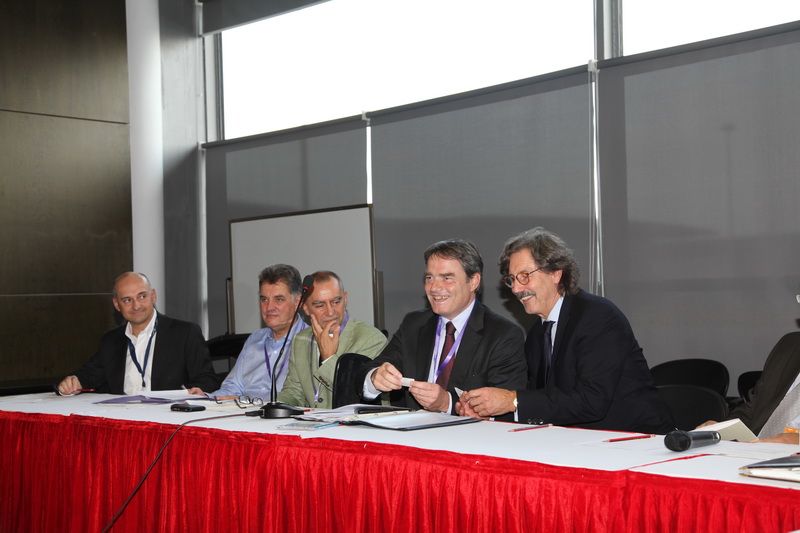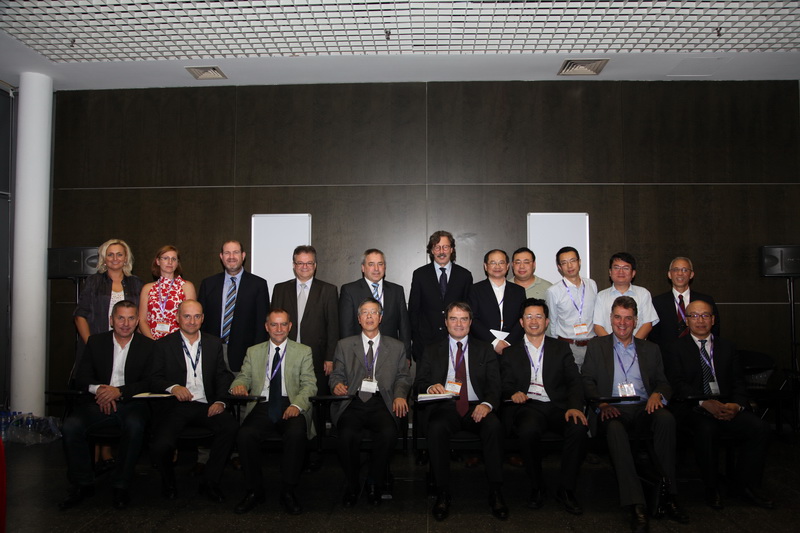Europe & China engage in dialogue
The China Musical Instruments Association (CMIA) and The Confederation of European Music Industries (CAFIM) met in Shanghai to continue with their exchange of information and views on topics relating to musical education, military-band music, trade barriers and Chinese market data as well as on research and development.
Europa und China im Dialog
Der chinesische Verband China Musical Instruments Association (CMIA) und der europäische Verband Conföderation der europäischen Musikindustieren (CAFIM) trafen sich in Shanghai und setzten ihren Informations- und Gedankenaustausch zu den Themen Musikerziehung, Militärmusik, Handelshemmnisse, Marktdaten China, Forschung und Entwicklung fort.
Musical education was recognized as being one of Music Industry’s key issues worldwide, this also applying to China. Accordingly, musical instruction continues to form a central topic of discussion in talks pursued by both the Chinese and European delegates. During a recent meeting, an example was presented of how musical education was capable of being implemented with success.
Thus, the focus of attention came to centre on the innovative “Music-in-the-Classroom concept developed by the Music Educators Academy in Wiesbaden, i.e. by music teachers for music teachers applied to collective instrumental musical instruction at normal state-run schools. Employed in various forms for teaching schoolchildren to master wind, bowed and percussion instruments, the “Music-in-the-Classroom” method has been in place for quite a number of years at the German School located in the Pudong district of Shanghai, close to the trade-fair grounds where the annual “Music China” expo is held. That being the case, it seemed sensible for both organizations that have meanwhile come to assemble for talks within the scope of the Music China Fair to sit in on lessons at the Pudong School. This also afforded a good opportunity for CAFIM members from Europe to acquaint themselves with this form of musical education. First introduced in Germany in 1987, the “Music-in-the-Classroom” concept has exercised tremendous influence on stepping up sales of musical instruments. Well over a million school-attenders have been found to engage in music activity later in life, if not altogether professionally then at least as a favourite leisure pursuit. Fully in alignment with the popular slogan: “Make more music makers“, this has resulted in business burgeoning in the music branch.
All those assembled to observe the classroom lessons in progress were positively impressed by the form of tuition, the pleasant atmosphere in which it took place and the enthusiasm shown by both the pupils and teachers. One of the music teachers providing tuition was discovered to have come over to Pudong from Germany and had previously received training at the Music Education Academy. He is assisted by two Chinese colleagues, one of whom likewise studied in Germany. At least three school days a week are spent on collective music-tutoring, this being complemented by tuition on a one-to-one basis. Hence, substantial learning progress manifests itself within almost no time at all.
Inspired by the stimulating sit-in session, the CMIA has now submitted a proposal for delegates representing organizations responsible for musical education at Chinese state-run schools and interested in applying the concept to participate in further guest visits.
In addition, it is intended to conduct a seminar on music tuition during the coming year, 2014, combined with teacher in-service training focusing on the “Music-in-the-Classroom” concept within the central complex of the ‘Music China’ expo, all aimed at propagating to other interested users on a broader scale what has been so successfully implemented in Germany. This would certainly endorse the objectives pursued by the organizers of the Frankfurt Music Fair who have been assisting the work of the Music Educators Academy and providing financial sponsorship to the “Music-in-the-Classroom” concept for years on end.
The subject of military-band music formed another focal point of the meeting with the aim of stimulating exchange of information and views between the Chinese and European delegates.
In addition, consideration was given to continuing with the talks in 2014 in conjunction with possible visits to schools and universities as well as to research institutions and production facilities.
The meeting was rounded off by a detailed overview on the part of the Chinese Association on economic development of the branch within the Peoples’ Republic of China: production, imports, exports and the Chinese domestic market. A survey of the statistical evaluations can be forwarded on request.
left to right: the delegates of CAFIM
Emmanuel Tonnelier, CEO of Vandoren, Board member of Chambre Syndicale de la Facture Instrumentale (CSFI), France
Stephen Wick, CEO of Denis Wick Products, United Kingdom
Claudio Formisano, CEO of Master Music, Vice President of CAFIM, President of Distribuzione Industria Strumenti Musicali e Artigianato (DISMAMUSICA), Italy
Antoine Beaussant, CEO of Buffet Group, President of CAFIM, Board member of Chambre Syndicale de la Facture Instrumentale (CSFI) and Bundesverband der deutschen Musikinstrumenten-Hersteller (BDMH), France
Winfried Baumbach, CEO of Bundesverband der deutschen Musikinstrumenten-Hersteller (BDMH), Secretary General of CAFIM
top row left to right:
Zuzana Ceralova-Petrofova, CEO of Petrof, President of Asociace Vyrobcu Hudebnich Nastroju (AVHN), Delegate Czech Republic
Ivana Stolarova, CEO of Strunal, Board member of Asociace Vyrobcu Hudebnich Nastroju (AVHN), Delegate Czech Republic
Renaud Patalowski, CEO of Marigaux, Board member of Chambre Syndicale de la Facture Instrumentale (CSFI), Delegate France
Klaus Schöller, CEO of Karl Höfner, Vice-Chairman of Bundesverband der Deutschen Musikinstrumenten-Hersteller e.V. (BDMH), Delegate Germany
Vaclav Hnilicka, CEO Amati, Board member of Asociace Vyrobcu Hudebnich Nastroju (AVHN), Delegate Czech Republic
Winfried Baumbach, CEO of Bundesverband der deutschen Musikinstrumenten-Hersteller (BDMH), Secretary General of CAFIM
Qian Fumin, Vice General Manager of Taixing Fengling Musical Instrument Group
Patrick Chen, Director of the Board of Hebei Jinyin Musical Instrument Group
Xiao Wei, Vice General Manager of Guangzhou Pearl River Piano Group.
Wen Cailin, Managing Partner, Shanghai Tenwen Law Firm, CMIA Law expert
Zeng Zemin, China Musical Instrument Association (CMIA), Secretary General
bottom row left to right:
Jaroslav Zeman, Member of the Parliament, Czech Republic
Emmanuel Tonnelier, CEO of Vandoren, Board member of Chambre Syndicale de la Facture Instrumentale (CSFI), Delegate France
Claudio Formisano, CEO of Master Music, Vice President of CAFIM, President of Distribuzione Industria Strumenti Musicali e Artigianato (DISMAMUSICA), Delegate Italy
An Zhi, China Musical Instrument Association (CMIA), President
Antoine Beaussant, CEO of Buffet Group, President of CAFIM, Board member of Chambre Syndicale de la Facture Instrumentale (CSFI) and Bundesverband der deutschen Musikinstrumenten-Hersteller (BDMH), Delegate France
Yu Hai, Chairman of China Association for Symphonic Bands and Ensembles (CASBE)
Stephen Wick, CEO of Denis Wick Products, Delegate United Kingdom
Chen Jinwu, Director Beijing Research Institute of Musical Instrument
Weltweit gilt Musikerziehung als eines der Schwerpunktthemen der Musikwirtschaft, so denn auch in China. Insoweit bildet Musikererziehung eines der Hauptthemen der Gespräche zwischen den chinesischen und europäischen Delegierten. Im Rahmen der kürzlich stattgefundenen Sitzung ergab sich die Möglichkeit, ein Beispiel, wie Musikerziehung mit Erfolg durchgeführt werden kann, kennenzulernen.
Es handelt sich um das an der Akademie für Musikpädagogik in Wiesbaden, von Musikpädagogen für Musikpädagogen entwickelte Programm „KlassenMusizieren“, einer Unterrichtsform mit Musikinstrumenten im Regelunterricht an allgemein bildenden Schulen. „KlassenMusizieren“ gibt es in den Varianten mit Blas-, Streich- und Perkussionsinstrumenten. Seit einigen Jahren wird dies an der Deutschen Schule in Shanghai Pudong, nicht weit vom Messegelände, auf dem alljährlich die ‚Music China‘ stattfindet, eingesetzt. Da lag es nahe, da man sich ohnehin im Vorfeld der Messe Music China mittlerweile schon traditionell zu Gesprächen verabredet, einen Unterrichtsbesuch abzustatten. Somit hatten auch die Kollegen aus den europäischen Mitgliedsländern der CAFIM die Gelegenheit, dieses Format der Musikerziehung kennenzulernen.
In Deutschland hat „KlassenMusizieren“, seit 1987 eingeführt, den Absatz von Musikinstrumenten erheblich stimuliert. Weit über 1 Mio. Schüler sind beim Instrument geblieben, zumindest als Hobbymusiker, etc., d.h. zahlreiche neue Kunden haben den Musikmarkt dauerhaft bereichert, ganz im Sinne des bekannten Slogans: “Make more music makers“!
Die Teilnehmer zeigten sich beeindruckt von der Art des Unterrichts, der angenehmen Atmosphäre und der Begeisterung von Schülern wie Lehrern. Ein Musiklehrer aus Deutschland, der an der Fortbildung an der Akademie für Musikpädagogik teilgenommen hat und zwei chinesische Kollegen, von denen einer in Deutschland studiert hat, unterrichten die Kinder an mindestens drei Schultagen gemeinsam; auch findet ergänzend Einzelunterricht statt, so dass bereits nach kurzer Zeit beachtliche Lernfortschritte festzustellen sind.
Beeindruckt vom Besuch des Musikunterrichts mit Musikinstrumenten soll auf Vorschlag von CMIA versucht werden, weitere Unterrichtshospitationen für interessierte Vertreter der Organisationen der Musikerziehung in China an allgemein bildenden Schulen, anzubieten.
Ferner ist geplant, im kommenden Jahr, 2014, auf dem Gelände der ‚Music China‘, zentral für alle Interessenten, ein Seminar zu Musikunterricht und Lehrerfortbildung „KlassenMusizieren“ durchzuführen, um dieses in Deutschland so erfolgreich praktizierte Modell einem größeren Kreis vorzustellen. Dies dürfte ganz im Sinne des Veranstalters, der Messe Frankfurt, sein, die seit Jahren die Akademie und damit die Programme des „KlassenMusizierens“ finanziell unterstützt, d.h. sponsert.
Das Thema Militärmusik bildete einen weiteren Schwerpunkt des Treffens mit dem Ziel, einen Informations- und Gedankenaustausch zwischen chinesischen und europäischen Vertretern anzustoßen.
Des Weiteren wurden Überlegungen angestellt, die Gespräche 2014 fortzusetzen, verbunden mit evtl. Besuchen von Schulen und Universitäten, Forschungseinrichtungen und Fertigungsstätten.
Das Treffen wurde abgerundet durch einen umfangreichen Überblick seitens des chinesischen Verbandes zur wirtschaftlichen Entwicklung der Branche in der Volksrepublik China: Produktion, Import, Export, Binnenmarkt. Eine Übersicht der statistischen Auswertungen kann angefordert werden.
v.l.n.r.: die Delegierten der CAFIM
Emmanuel Tonnelier, Geschäftsführer (CEO) Vandoren, Vorstandsmitglied Chambre Syndicale de la Facture Instrumentale (CSFI), Frankreich
Stephen Wick Geschäftsführer (CEO) Denis Wick Products, England
Claudio Formisano, Geschäftsführer (CEO) Master Music, Vizepräsident CAFIM, Präsident Distribuzione Industria Strumenti Musicali e Artigianato (DISMAMUSICA), Italien
Antoine Beaussant, Geschäftsführer (CEO) Buffet Group, Präsident CAFIM, Vorstandsmitglied Chambre Syndicale de la Facture Instrumentale (CSFI) und Bundesverband der deutschen Musikinstrumenten-Hersteller (BDMH), Frankreich
Winfried Baumbach, Geschäftsführer (CEO) Bundesverband der deutschen Musikinstrumenten-Hersteller (BDMH), Generalsekretär CAFIM
obere Reihe v.l.n.r.:
Zuzana Ceralova-Petrofova, Geschäftsführer (CEO) Petrof, Präsident Asociace Vyrobcu Hudebnich Nastroju (AVHN), Delegierte Tschechische Republik
Ivana Stolarova, Geschäftsführer (CEO) Strunal, Vorstandsmitglied Asociace Vyrobcu Hudebnich Nastroju (AVHN), Delegierte Tschechische Republik
Renaud Patalowski, Geschäftsführer (CEO) Marigaux, Vorstandsmitglied Chambre Syndicale de la Facture Instrumentale (CSFI), Delegierter Frankreich
Klaus Schöller, Geschäftsführer (CEO) Karl Höfner, Vizepräsident Bundesverband der Deutschen Musikinstrumenten-Hersteller e.V. (BDMH), Delegierter Deutschland
Vaclav Hnilicka, Geschäftsführer (CEO) Amati, Vorstandsmitglied Asociace Vyrobcu Hudebnich Nastroju (AVHN), Delegierter Tschechische Republik
Winfried Baumbach, Geschäftsführer (CEO) Bundesverband der deutschen Musikinstrumenten-Hersteller (BDMH), Generalsekretär CAFIM
Qian Fumin, stellv. Geschäftsführer Taixing Fengling Musical Instrument Group
Patrick Chen, Aufsichtsrat Hebei Jinyin Musical Instrument Group
Xiao Wei, stellv. Geschäftsführer Guangzhou Pearl River Piano Group.
Wen Cailin, Anwaltskanzlei Shanghai Tenwen Law Firm, CMIA Rechtsbeistand
Zeng Zemin, China Musical Instrument Association (CMIA), Generalsekretär
untere Reihe v.l.n.r.:
Jaroslav Zeman, Senatsabgeordneter, Tschechische Republik
Emmanuel Tonnelier, Geschäftsführer (CEO) Vandoren, Vorstandsmitglied Chambre Syndicale de la Facture Instrumentale (CSFI), Delegierter Frankreich
Claudio Formisano, Geschäftsführer (CEO) Master Music, Vizepräsident CAFIM, Präsident Distribuzione Industria Strumenti Musicali e Artigianato (DISMAMUSICA), Delegierter Italien
An Zhi, China Musical Instrument Association (CMIA), Präsident
Antoine Beaussant, Geschäftsführer (CEO) Buffet Group, Präsident CAFIM, Vorstandsmitglied Chambre Syndicale de la Facture Instrumentale (CSFI) und Bundesverband der deutschen
Musikinstrumenten-Hersteller (BDMH), Delegierter Frankreich
Yu Hai, Vorsitzender China Association for Symphonic Bands and Ensembles (CASBE)
Stephen Wick Geschäftsführer (CEO) Denis Wick Products, Delegierter England
Chen Jinwu, Direktor Beijing Research Institute of Musical Instrument


